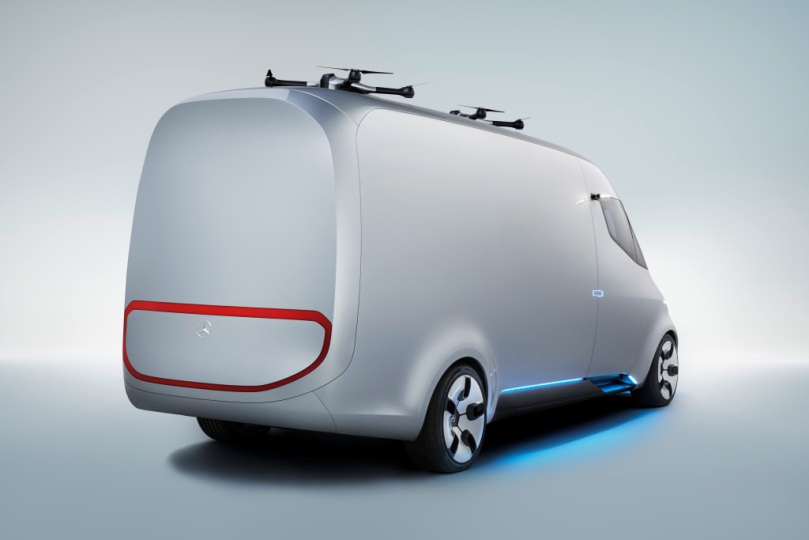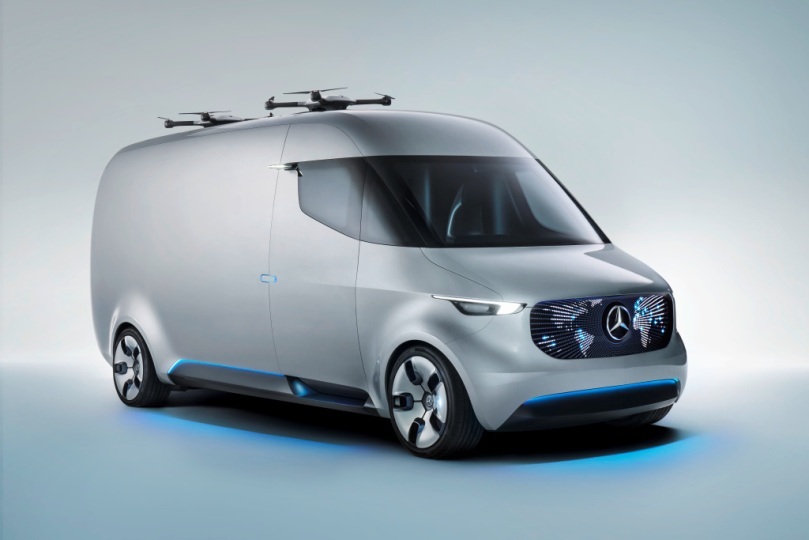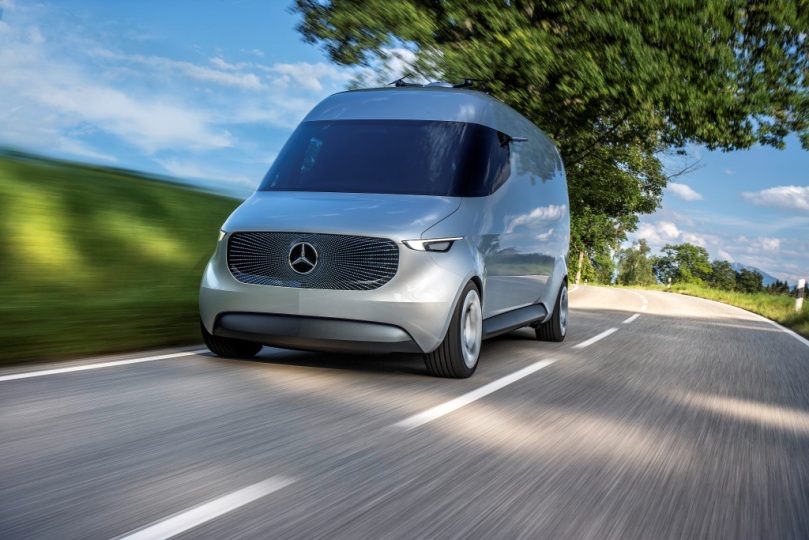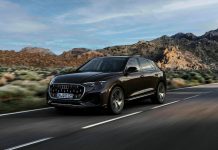
Mercedes-Benz Vans launches future initiative adVANce to expand its growth strategy and develop new business models
Investments of approximately 500 million euros over the next five years for digitalisation, automation and robotics in vans as well as innovative mobility solutions
New organisational unit within the start-up scene in Stuttgart, Berlin and Silicon Valley – approximately 200 employees already work on numerous projects
Close cooperation with start-ups, including first strategic investments – among others in Matternet
All-electric “Vision Van” van study with a range of up to 270 km, fully automated cargo space and integrated drones
Today the globally successful van manufacturer Mercedes-Benz Vans has unveiled its strategic future initiative adVANce for the transport industry. This sees the division systematically taking up its customers’ changing requirements.
The transformation of the industry is the result of various economic and social trends, among them urbanisation, the growth in e-commerce, the intelligent networking of a wide range of technologies in the Internet of Things (IoT), and the proliferation of platform-based business models.
Mercedes-Benz Vans is systematically making use of present-day and future technological opportunities presented by digitalisation, automation and robotics. The business division is developing from a mere vehicle manufacturer into a provider of system solutions and will offer integrated and intelligent systems in addition to its basic vehicles in the future.
These solutions can make the transportation of goods and passengers even more efficient and open up new business opportunities and economic benefits for costumers.
“In the first six months of this year, we brought in the best results yet for Mercedes-Benz Vans. This provides us with an excellent foundation to position our vans division systematically for the future”, said Volker Mornhinweg, Head of Mercedes-Benz Vans, at today’s Van Innovation Campus in Stuttgart.
“To live up to the dramatic changes in our sector, we adapt our ‘Mercedes-Benz Vans goes global’ strategy and expand it beyond the product and untapped international markets. We are focusing our attention beyond the vehicle on the entire value chain and business environment of our customers. We provide transport solutions for the digital age and evolve the van into an intelligent, interconnected data centre on wheels. In order to do this, we are investing around half a billion euros over the next five years, and we created a separate organisational unit. So far, this approach is unique within the van sector.”
Identifying the customer requirements of tomorrow
With the adVANce initiative, Mercedes-Benz Vans is systematically adapting to new, rapidly changing customer requirements. Examples include the burgeoning business in food and everyday necessities ordered online. Here, demand for same-day delivery or delivery within an hour is increasing rapidly. At the same time, more and more people are living in cities – by 2030 urban areas will be home to more than two thirds of the world’s population. It is clear that the rising transportation requirements will need to be met even faster and more efficiently in future and, above all, in an environmentally friendly way.

All-electric “Vision Van” van study for innovative delivery on the last mile
Mercedes-Benz Vans is presenting a fascinating, integrated solution for new customer requirements with the “Vision Van” van study, which was presented today and evolved as part of the adVANce initiative. This all-electric vehicle combines various innovative solutions for last-mile delivery in urban and suburban environments.
It is the first van worldwide to fully digitally connect all people and processes involved, from the distribution centre to the consignee. Furthermore, it is the first van ever to feature a fully automated cargo space and integrated delivery drones.
For example, if a parcel service provider stops his vehicle in a residential area, it will be possible to deliver multiple packages to nearby consignees autonomously by air – even if they are not at home – in addition to manual delivery. This makes the deliverer’s job easier, reduces the delivery time and offers end customers new opportunities such as same-day delivery at an agreed time. Mercedes-Benz Vans envisages deployment of the Vision Van boosting efficiency by up to 50 percent on the last mile.
The vehicle is equipped with a 75 kW electric drive and – depending on the intended application – has a range of 80 km to approximately 270 km. With the Vision Van, deliveries are emission-free.
“With the Vision Van from Mercedes-Benz Vans we provide an idea of future generations of vans: the intelligent automation technology connects the entire process, from loading and transportation by road through to delivery to the consignee. This makes it easier for the deliverer to do business and rapidly reduces the delivery time for end customers,” adds Volker Mornhinweg.
“Equipped with an electric drive system, the Vision Van not only operates locally emission-free, it also moves almost silently. This means that it can be operated in cities even during times when there are traffic restrictions or for late-night deliveries in residential areas. This gives our customers the possibility of offering new services to their customers.”
Focusing on three key fields of innovation: adVANce
As part of the strategic future initiative, Mercedes-Benz Vans will be focusing on three fields of innovation: the first involves incorporating the van into the Internet of Things. For this purpose, Mercedes-Benz Vans is integrating smart technologies into the van, which increase its efficiency and make it a central component of the digital value chain. The focus here is on relevant applications and connectivity solutions (digital@vans).
One example is developing a telematics unit for vans which collects and processes data concerning the status of the delivery tour, the present location and the load, and sends this information to the distribution manager. In this way it is possible to monitor and manage last-minute changes within the fleet efficiently from a central point.
Another application concentrates on the efficient part and tool management for service vehicles, for example tradespersons’ mobile workshops. In future new holistic system solutions will enable parts to be ordered in a fully automated way by means of an intelligent inventory management within the vehicle, as well as for the relevant parts to be placed overnight directly into the van. Intermediate steps such as inventory evaluation, ordering parts manually and the tradesperson having to equip the vehicle are no longer necessary.
The second focal point is on innovative hardware-based solutions for the transportation industry (solutions@vans). Here Mercedes-Benz Vans is working on automated cargo space systems for delivery vehicles for parcel services, for example.
Until now, deliverers need to rearrange their packages (on average around 180 per load) ten times while making deliveries within a residential area and schedule approximately three to four minutes per stop. New, interconnected cargo space systems make loading and unloading much faster, thereby increasing process efficiency.
One-shot loading (loading the vehicle with all pre-picked parcels in one go) cuts loading times considerably and reduces the amount of vehicle downtime at distribution centres. When the deliverer is unloading, the system will show him the exact load configuration and make the right package available at the right time for delivery depending on the delivery destination.
The team at Mercedes-Benz Vans also has the integration of autonomous delivery systems such as drones or self-driving robots in mind.
The third field of interest for the Stuttgart-based van manufacturer in conjunction with various cooperation partners is new mobility concepts for the on-demand transportation of goods and people (mobility@vans). In future these intelligent mobility concepts could supplement public transit by making fast, efficient and individual transport of passengers possible during peak and off-peak hours via ridesharing concepts.
In the future, the intelligent networking of technologies can also make the transportation of goods more efficient and considerably improve transport on the last mile. In this pioneering field Mercedes-Benz Vans is also working on innovative leasing, rental and sharing models, which are completely tailored to the needs of van customers.

New organisational unit within the start-up scene
In order to fully exploit the numerous opportunities of evolving the van and vehicle-related business systems, Mercedes-Benz Vans has created a new organisational unit called Future Transportation Systems. The project teams are based within the start-up scene in Stuttgart, Berlin and Silicon Valley.
In total around 200 employees are working on these topics. They work closely with customers and partners from business, technology, logistics, research and the public sector. The objective of working with young companies is to combine the knowledge of the vehicle sector accumulated over decades with new perspectives, agile working methods and innovative ideas.
Strategic investments in innovative start-ups
In order to make new approaches market-ready, Mercedes-Benz Vans is investing in several innovative start-ups in the areas of automation, robotics and mobility services in a first step. One of the companies that Mercedes-Benz Vans has a stake in is Matternet, a US-based developer of autonomous drone logistics systems.
Together with Matternet, Mercedes-Benz Vans worked on the Vision Van show car, the first integrated delivery system that automates last-mile delivery. The new system, which combines van and drone logistics, is a more efficient, faster and a more economical way for people to receive goods on-demand.
Mercedes-Benz Vans achieves most successful first half year ever with records in unit sales, revenue, EBIT and return on sales
In the first half of 2016, Mercedes-Benz Vans achieved the best figures in its history. Unit sales increased by 21 percent to approximately 176 200 vehicles (prior-year: approximately 145 400 units). The entire product portfolio contributed to this increase in unit sales. Revenue was up 19 percent to 6256 million euros, another best-ever level (prior-year: 5244 million euros).
EBIT and return on sales climbed by 56 percent and 30 percent to 702 million euros and 11.2 percent reaching a new record level (prior-year: 449 million euros and 8.6 percent). Mercedes-Benz Vans anticipates further significant growth in unit sales for the 2016 financial year as a whole. The business division is also expecting a significantly higher EBIT from ongoing business in 2016 compared to 2015 as well as a significantly higher return on sales.
The Mercedes-Benz Vans division
Mercedes-Benz Vans is a global full-line supplier of vans and related services. Alongside the large-size Sprinter van and the mid-size Vito van (known in the US as Metris), the division’s worldwide product portfolio includes the Mercedes-Benz Citan urban delivery van. Mercedes-Benz Vans is also represented in the private segment with the V-Class MPV and the Marco Polo and Marco Polo ACTIVITY travel vans.
The division has a total of nine production locations: in Germany, Spain, the USA, Argentina, China (joint venture with Fujian Benz Automotive Co., Ltd), France (strategic alliance with Renault-Nissan) and Russia (partnerships with GAZ and YaMZ). To date, the main markets have been in Western Europe, accounting for a total of 65 percent of unit sales in 2015.






































